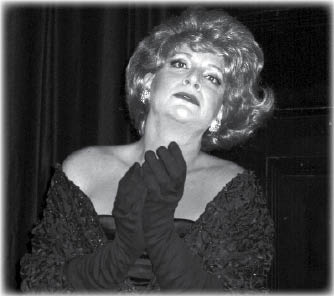Some Men
by Anthony Chase

For me, it’s as if Tennessee Williams handed us a play and said, ‘Go do it,’” says actor Jimmy Janowski, who is currently starring in Terrence McNally’s Some Men for BUA. “If you name the top living American playwrights, Terrence McNally is right up there.”
Janowski is a star with the BUA company, best known for appearing as grand leading ladies in a litany of shows, from Daphne Du Maurier’s Rebecca to Charles Busch’s The Lady in Question. Beloved of the BUA audience, he is one of the few actors in Buffalo whose stage entrances inspire entrance applause. BUA was the first theater company in the country to be granted rights to produce Some Men since it made its debut in New York earlier this year. The playwright personally granted the permission.
“I find it amazing that Terrence McNally has even heard of BUA,” exclaims Janowski, “much less that he would hand us this brand new play, his baby, and trust us to treat it well.” (Actually, BUA has many affectionate connections to the larger theater world. Janowski’s own collection of theater memorabilia includes the poster advertising his own appearance in Charles Busch’s Die, Mommy Die! inscribed: “To Jimmy—thanks for keeping me alive in Buffalo! Charles Busch.”)
McNally is the author of such award-winning plays as Master Class; Lips Together, Teeth Apart and Love! Valour! Compassion!, as well as the scripts for such musicals as The Full Monty, Kiss of the Spider Woman and A Man of No Importance. A revival of his play, The Ritz, just opened on Broadway starring Rosie Perez. BUA was also the first theater company in the nation to produce Love! Valour! Compassion! after its New York debut in 1994.
Some Men is a series of vignettes about the evolution of gay relationships in the 20th century, leading up to the call for gay marriage.
“In this play, McNally just wants to say so much,” observes Janowski. Each scene is a one-act play that fits into a bigger picture, and there are gems in there that are so juicy. I love performing it, every night.
“I love his use of comedy. He takes a fresh approach to everything, and he also takes us to familiar places. From ‘Butcha are, Blanche!’, which I get to say, to the scene with the Gender Studies students. We have seen documentaries about these issues, but if you consider his treatment of Stonewall, where he makes us laugh and he makes us thoughtful. It’s just so wonderful.”
In the show, Janowski plays a variety of characters, including an effete man in therapy, a drag queen with issues and an older gay man reminiscing about the good old days.
“I was looking at a review of the show and the author said the show is ‘jammed with stereotypes,’” notes Janowski. “I’m not sure how to look at that. I guess it was meant in a negative way, but you often hear non-gay people refer to any gay character in theater or film as a ‘stereotype,’ maybe because they don’t really know that many gay people, and probably because there is nothing dramatic about the gay vet who lives next door. But then, I think they probably think I’m a gay stereotype myself! I am that show-tune-singing, Barbra-Streisand-lovin’ gay that is the butt of so many jokes. And thank God! I’m a little bit of the color purple in this grey world.
“The point is, we’re talking about ‘characters.’ They are created by the playwright in the space of a few minutes with a few broad strokes, and if we play them right, we create an illusion and audiences feel as if these are people they know intimately. That being said, aren’t all characters ‘types’—the good guy, the villain? Hopefully, a good play will color these blank characters and make us think about them differently from the way we did originally, thus giving us insight—and in the case of gay characters, tolerance.”
Indeed, we do not think of Hamlet as that brooding young straight guy, or Willy Loman as that washed up and disillusioned straight guy. We recognize greater complexity within the “type.” The idea of “tolerance” makes Janowski think about the characters he plays in Some Men.
“Ironically the most judgmental character in Some Men is a character I play, the drag queen from Bethpage, Long Island. I love that twist. The character most likely to be a stereotype turns out to be the most judgmental of the gay men around her.
“When I read the script, I thought to myself, ‘Okay, how do I play another drag queen and make her different?’ I mean, I played ‘the good-hearted performer,’ Arnold, in Torch Song Trilogy; the morally bankrupt drag queen in Bent; the joyful optimism of Brother Boy in Sordid Lives; and now this foul-mouthed hell raiser, Archie, who just happens to have all the longing of the world wrapped up inside that taffeta dress. He enters in an elegant evening gown, looking graceful and vulnerable, and then—surprise!—all that anger comes out! I love that!
“Well there you go, all these different people, so easily characterized as stereotypes, and no two are alike!”
This whole play is filled with different types of gay men with different opinions. Some I agree with; some I do not. I love the scene between the gay seniors and the gay Gender Studies students from Vassar for that reason. It certainly makes it clear to me that gay people are just as individually unique as non-gay people.
The BUA production of Some Men continues at Alleyway Theatre, Fridays and Saturdays, through October 27.
|
Issue Navigation> Issue Index > v6n42: Trucking Buffalo (10/18/07) > Some Men This Week's Issue • Artvoice Daily • Artvoice TV • Events Calendar • Classifieds |









 Current Issue
Current Issue